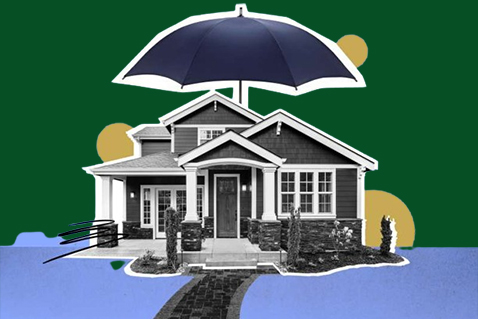Does Home Insurance Cover Tornado Damage – Each time a tornado occurs, it causes so much damage to properties, although not as much damage as other severe weather events such as hurricanes and wildfires. Heavy tornadoes can destroy a wide area, trees, businesses, and even homes. In times like this, recovering from losses in your home can be financially difficult, but does home insurance cover tornado damages?

Most times, tornadoes occur during tornado seasons but it depends on what time and your home location. There are some locations where the occurrence of a tornado is frequent while there are others where it’s not. If you have home insurance coverage and your property gets damaged due to a tornado, the damages made may be covered by your insurance.
If your home gets damaged due to a tornado, you need to check if your home insurance covers the damages it makes and what types of damages it covers. However, to gain knowledge about how this works, read through my write-up for all the information you need.
Does Home Insurance Cover Tornado?
Does Home Insurance Cover Tornado Damage – Home insurance policy will cover damages to a home due to a tornado and other wind-related issues. Generally, this coverage covers wind, tree, and rain damage to homes. It also covers mold damage but does not protect against flood. If you would like your insurance to cover flood, you will need to get flood insurance coverage as an additional coverage to your home insurance. This additional coverage may be a good idea if ever a tornado causes a flood to your home.
What Home Insurance Policy Covers Tornado?
Home insurance is broken into three different coverage types. These types of home insurance coverage are:
Dwelling Coverage
This coverage covers the physical structure of your home. If ever your home gets damaged due to a tornado, this coverage will cover the rebuilding of your home. Dwelling coverage does not only cover the structure of your home but also other structures like a deck or garage. It covers detached structures like a fence or sheds under “other structures coverage”. However, this insurance has limits based on how much it costs to rebuild your home.
Personal Property Coverage
This home insurance coverage covers payments for replacements or repairs to your belongings damaged due to a tornado. These properties include items like clothes, furniture, electronics, jewelry, kitchen appliances, rugs, toys, and even artwork on your walls. Personal property insurance coverage is generally set at a particular percentage of the dwelling coverage.
Additional Living Expenses Coverage
If you need to leave your home due to damages caused by a tornado, this coverage will cover the expenses for bills such as meals, hotel bills, and other costs. This coverage is sometimes referred to as “loss of use”. It also covers a certain percentage of your dwelling insurance.
What to do After a Tornado
After the occurrence of a tornado, you need to take a few steps to make your claim process easier and faster. First, you need to check out how much damage is done and write them done. After doing that, you can follow the below steps to guide you through it.
Secure Your Property
Does Home Insurance Cover Tornado Damage – Immediately after a tornado occurs, you must secure your properties to prevent more damage. This may include boarding up openings and closing exposed areas, this can help your insurance claim.
Accessing and Addressing Safety Hazards
Safety is important before any other thing. Before recovery efforts, you need to identify and address hazards like gas leaks, electrical issues, and others to make sure the area is ok for you and your family.
Itemizing Damages and Losses
After your property is safe, write down the extent of damage that was made by making a well-detailed list of affected items and areas and taking pictures and videos. This process will help you a lot when filing claims.
How to File a Tornado Insurance Claim
If your home is damaged because of a tornado, the following are steps to file a claim on your home insurance.
- Check your home for any structural issues. Do not stay in a damaged building unless you are instructed to.
- Avoid downed power lines.
- Be conscious of debris, exposed nails, and broken glasses.
- In cases where yoususpect your home is damaged, turn off electrical power, propane tanks, and natural gas.
- Take pictures and videos of your home’s damage, both in and out.
- Make use of your home inventory to consider what items would need repairs or replacement.
- If you can’t live in your house due to the damages, keep safe the receipt of all expenses like meals and hotel bills.
If your home damage is beyond imagination, you may need to hire a public adjuster to help you with the claim process. However, you will need to inform your insurance company on time and disclose every information concerning the event.

